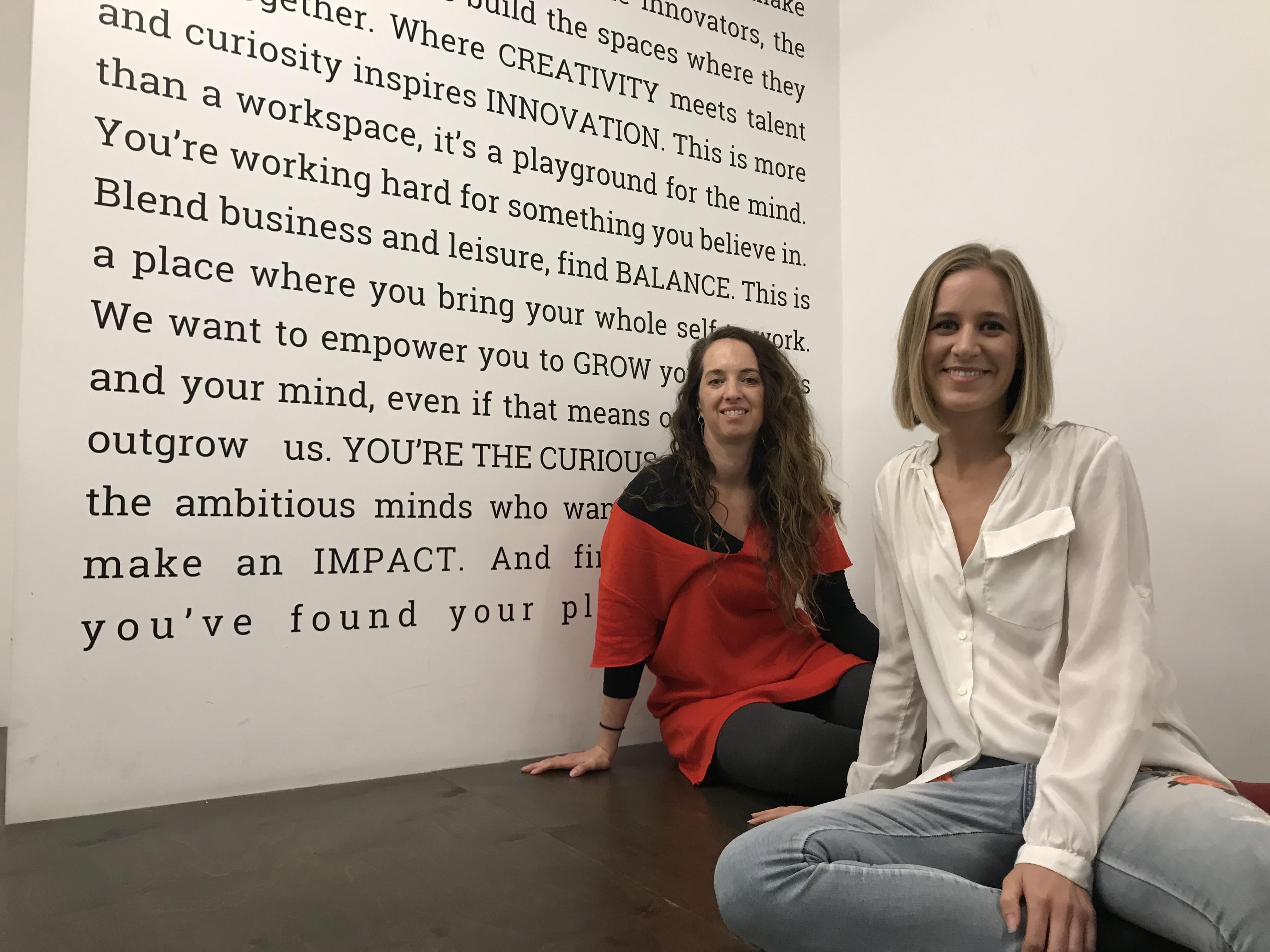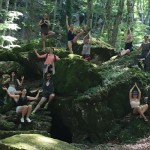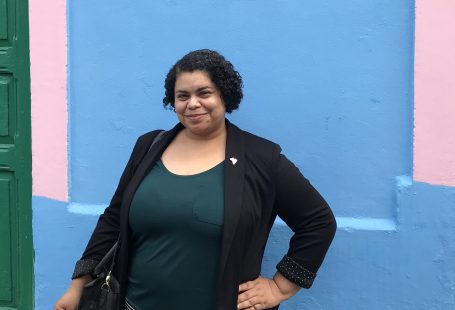Today I’m connecting with Rebecca, from The Well. She and I met pretty much as soon as I arrived at Huckletree and bonded right away. We have a lot of very similar interests and values, so I’m delighted that when she got back from her latest trip, she made time to have this in-depth chat with me. We talk digital nomading, self-care on the move, the power of journaling and how she relaxes. It’s a super interesting chat and she is working on some fantastic concepts for the Well, so make sure you look her up. By the way, the words right behind us in the image are Rebeccas own. There are some really powerful ones in there, words that we conjure up and discuss during our conversation. I hope you enjoy.
Keep scrolling to read the interview or you can listen in to hear Rebecca and I chat. Do be aware that the sound on this one is not great. I was getting the hang of the mic !
So, Rebecca, what are you up to right now?
I am trying to work out how to weave mental health and wellbeing more into my work. I’m a brand consultant, and I’ve been working with startups traditionally, but I want to shift more towards my purpose, which is shifting the stigma of mental health and also helping people to just be getting to know themselves better.
What sort of clients are you hoping to work with? Who would be your ideal client?
I’m a little bit stuck in thinking about startups, to be honest. There are some really cool things happening with technology in mental health that are scalable and can have a huge impact on a lot of people, but I’d also like to shift towards more offline, in-person, community businesses or initiatives. Anyone who is very much hoping to have an impact on mental health would be my ideal. It’s more about them and their purpose that’s important to me.
So, we’ve met today at Huckletree, a coworking space, where a lot of companies like that do work. Why do you like coworking spaces?
I have a massive bias with coworking. I got into the industry about four years ago. I was actually working on platforms for connecting coworking spaces, and also running coworking spaces, so I was one of the first employees at Huckletree a few years ago. I’m really attached to this space and to the community of people that’s grown into it and grown with Huckletree.
Coworking, overall, for me is a place where I know I can find people who have quite the similar value set, who are also fairly ambitious and entrepreneurially-minded, and just interested in creating some kind of impact. It tends to be a space where I can find really interesting connections.
I’m personally looking into becoming a digital nomad. I’m really at the start of my journey of nomad revolution, and I know that this is something that you’ve been doing for a little while. Can you tell me a little bit more about that, and how you manage to work from anywhere?
It’s a constant cycle of experimentation for me. I grew up in Australia, actually, so even in the first place, moving to London, to me, was a big shift. I’ve also moved to Paris in the middle there, and that was when I started freelancing, so it came out of necessity almost, where a lot of my clients were in London, and then some of them were in Paris. But it was actually the first client I worked with called Copass, and that was a community of coworking spaces, that really triggered me to start thinking about it and that idea of being able to be anywhere, so you can actually just flow with whatever opportunities are around you.
And now I’m really involved in a co-living space a well, called Cohome, and that’s just about being able to have that sense of community and home wherever you happen to be. My work and my social life have been about finding a sense of belonging while moving around. I think, just because it’s something that’s fairly in my nature, and I’m also really interested in communities, so that’s been my method of actually doing it. Whenever I go somewhere, I try and tap into … To be honest, I was going to say, the local community, but I’m not great at that. Actually, what I am used to tapping into is the nomad community.
When I get to a new place, because everyone is in that similar position, and really accepting, and really understanding of people who are working while they’re travelling at the same time because that’s actually quite unusual. If you’re just around travellers, you don’t tend to have people nurturing that productive side of yourself while you’re there, and it’s very easy to drop out of your work focus when you’re not surrounded by it.
So, would you tend to use coffee shops, or really specific, like coworking spaces in these locations? And would you say that you’ve searched out locations because of the amazing coworking?
Yeah, I very much search for the coworking spaces. Before I go to a place, I tend to do a Google Maps search for coworking spaces, and then I can get a feel, just based on their branding, of what their priorities are as a space. I tend to be looking for spaces that have an emphasis on balance, in a community, on events. They’re not strictly tech but are often employing a lot of tech in what they do. They’re the core features, really. It also comes down to design a little bit. And then I’ll look for, essentially, the hipster coffee shops because Shoreditch Leg Café has given me a really good writing flow.
So, yes, I shift around based on the type of work I’m doing as well. When it’s more organizational and process-driven, it’s better for me to be in a coworking space. When it’s creative, I’ll move around a lot more, so even if I’m in a coworking space, I’ll tend to end up on the sofas or hiding in some ergonomically unfriendly place, so a combination of coworking, coffee shops, and just working from home, if that option is available.
And how are you finding these places? You’re literally Googling, or are there special groups that you join?
I actually Google now, but I do often put out a call on Facebook as my go-to. I’ll just say, “Guys, I’m going to this city. Who knows it well?” Typically, I’ll have an idea of a few people I know who have been there or are there at the time, so I’ll just tag them in it. I get a few recommendations for places, people to meet, and that kind of thing, and then I can filter out from there, and those people to almost validate my research. But I think I just like doing the research part of it because it gives me some of the anticipation of going to a place, so I don’t think I would cut that out completely, but I do also ask for recommendations. And then it’s when you get there, you start meeting people, and they direct you to the right types of places. You find one place that really works for you. The people you meet there will tend to know other places that really work for you.
Do you often see the same people, over and over, when you move around?
I did in Asia, definitely. Asia was the longest chunk where I was travelling continuously, so there was a common thread. There is, a sort of, a nomad migration that happens. I hate myself for saying that, but it is. And, like, people will be in Europe, a lot of the time, for European summer and then move down to Asia for the winter.
And then, even within Asia, you’ve got the cycles of it being a good period to be in a certain place. In Chiang Mai, for example, which is a hub, you have burn season, so everyone gets out, and a lot of people go to Bali. Then you’ve got the visa restrictions, so you’ll find people jumping between Bali and Kuala Lumpur, or Bali and Thailand. I don’t profess to be an expert in it, but that’s, sort of, what I saw happening in the one season that I was there.
In Europe, I’ve done more sporadic trips, so I bump into the same communities of people. I will really frequently meet people who I have 20 mutual friends with, for example, so it’s definitely a small world, but I don’t bump into the same people all the time.
Goodness, it sounds really, really cool. Out of all the cities that you’ve lived in, as a digital nomad, or coworked in, which is your favourite, do you think?
Canggu, in Bali. I think it always ends up being a really personal thing based on not just how well a place fits with your personality but what’s going on at the time in your life, in your context, in the place. So, Canggu for me was a perfect storm of it being the first place I went to from London a couple of years ago, me being in a really good creative atmosphere, the coworking space there, a dojo, has a very special place in my heart, and it has a swimming pool.
It’s hard not to love a place where your coworking space has a swimming pool. And the team there are awesome as well. Certainly, Michael, who started the place, is really connected with all of the members who are in there. Yeah. It’s just, I have really fond memories of it because of the lifestyle that I created around it.
What fun. How would you say you get inspired? I mean, you mentioned that you go to certain coffee shops when you wanted to do certain things, but is there anything else outside of that that would give you real inspiration if you had to do a specific writing project?
It tends to be from talking to people, I think. Yeah. If there’s a particular subject that I’ll want to be diving into, I get a real energy boost from having some sort of brainstorming session with someone else who’s really enthusiastic about it. I think, for me, that’s a reminder that I’m not crazy in being interested in it. It’s like, oh, there are other people who are interested in it. If I’m writing about it, there will be other people who actually care to read about this subject, so it’s just a little bit of that confirmation, as well, before stepping into it, but there will also be ideas that they trigger that I haven’t necessarily had, or they might give me one node of information that connects with a lot of what I already believe or a lot of what I was wanting to communicate, and through that conversation I’ll just get that real kick to go and start.
Is that real life, or is this online?
Real life. Real life definitely does it stronger than online, but in the complete absence of it, I could get it online as well, but I think it’s just a very different energy when you’re sitting face to face with someone in person …
Well, I guess that’s maybe why you search out coworking spaces, for that connection.
Definitely. The energy of being around people makes a huge difference.
And how do you relax when you’re on the move? Obviously, you’re going to all these different places, you may be travelling for a long period of time, not everything is quite so set because, in any of kind of travel, things go wrong, but this kind of travel can be, sometimes, maybe, more extreme. How do you find quiet moments?
It’s a very good question, and I can’t wait to hear other people’s answers because I think they will give me great fuel. But, I’m not great at it, to be honest. My body … I have PMDD which is kind of like if you imagine a cross between PMS and bipolar, so it’s the manic-depressive cycle but following your hormonal cycle, so I’m almost forced into that relaxation for at least once a month, which is almost like a little gift from the universe in really ugly packaging. During that time, it’s like, just making sure I rest. I’m pretty good at doing the really cliched self-care things like yoga and meditation. I write every morning
Sometimes it’s gets disrupted on travel days, but it’s a practice called Morning Pages, which comes from The Artist’s Way. It’s essentially just free writing every single morning, and it’s basically free therapy. It’s been a really empowering process for me.
I’ve not really been doing it long enough to be able to see the long-term impacts of it, but even in the short term, so, it’s been about two months of doing that consistently, I can see it’s shifted the way I think, which is amazing. And, just, I think I need to be better at doing the things that I know just make me feel really happy, like getting out into nature and dancing. Dancing is amazing, and you forget about everything.
Do you read?
I do, but I read for really functional reasons, so it’s not like I research … I obsessively research, especially things to do with the mind, psychology, human behaviour, anything in that field that’s about trying to understand how we work as people. That’s my main form of reading, so I do occasionally try and push myself into just reading fiction. It’s something I can enjoy. I’ve just started re-listening to The Fault in Our Stars It’s written by John Green, and, yeah, it’s a young adult fiction book that just is an incredible portrayal of human emotion. So, yeah. Even if I’m reading fiction, it’s because I want to understand human emotions and relationships.
So, you’re always working, basically?
I can’t really distinguish my social life from work, which I definitely am not saying to brag about it. I don’t think it’s a good thing at all. So, yeah, it’s moments of finding something that is completely separate and being able to give myself permission to not be … I was going to say, to not be productive, but, actually, I’m not producing a lot of the time, but I feel like I should be. So, it’s giving myself permission to be comfortable with not being productive and to just accept it, and be like, I don’t have to be productive all the time. It’s not my obligation.
I feel like that’s one of the stresses of being an entrepreneur or working for yourself is that you feel you should be working 24/7?
And most people I’ve spoken to about this have the same sort of concern. I don’t think anyone’s found an answer yet. And I think part of it must come down to, and part of the reasons that we will eventually shift is understanding that we’re doing ourselves a disservice by trying to be productive all time when it’s actually making even our productive time less productive than it could be.
And also, life is about more than that, that for some stupid reason, that’s not enough to just be like, okay, life is about more than achieving things. That’s not enough to just let go of it. I think you also, then, have to believe that it’s not productive. But I don’t know. I’m very much in the middle of that journey right now.
Obviously, you’re travelling around and working, so even though you’re in these places like Bali, etc etc, you are still actually working, so do you go on a designated holiday where you take a week or a few days, and say, this is a holiday. I’m not touching the computer?
Rarely, but I should. The first time I went to Bali was for two weeks, actually, during the time I was working at Huckletree, and I think because I had a full-time job, I left my laptop, so I went completely without. I had my phone with me, but I didn’t check emails. I wasn’t even online most of the time, as in, I didn’t have a SIM card. That was the most disconnected it’s been, and it is really valuable.
I’m quite good, in general, at just not taking my technology out with me, but taking a fixed holiday that’s completely removed from work, not so much. It would have to be a really conscious effort of setting it aside because, it’s like, by default it’s there constantly. There’s always something I can be doing, and there’s always something I can convince myself I’m supposed to be doing. Like, I can always persuade myself that someone has an expectation that I will reply to their email or something like that, when, actually, I can just change the expectation.
That’s a big mindset shift, though, isn’t it? I know. Yeah. I struggle with that relentlessly. So, let’s say you could take a week off and do your ultimate holiday with no phones, like, off the grid, perhaps, where would you go if you did?
Being unadventurous, I would go and go back to Bali. But, I think, actually, something … It would be somewhere warm, sunny, with beaches. I’d like to be near a beach so that I can do yoga there in the mornings. It would probably be quite a yoga-focused trip.
I want to just say, I would just go somewhere and spend my days writing, but I’m on the fence about whether or not that counts as work. If no one’s paying me to do it, then it’s just fun, right? But, actually, it’s still that trying to be a productive thing, so I think, somewhere where I can go, and learning to dance would be really cool. I think, somewhere in South America.
What would you say really helps you with not getting burned out? We talked about self-care a lot, but … what else ?
My illlness PMDD. The most effective method. It really is, though, because I can’t get deep enough into burnout. I can’t spend three months excessively burning myself out because my body forces me to stop before then. But that said, within the course of a month, I can burn myself out by trying to force through it and not pause. So, what stops me?
I think I’m just really aware of my anxiety levels. I notice it with anxiety, essentially, and as that’s picking up, I’m just like, I need to pay attention to this, and then reduce, like, cut out what I can, make white space in my calendar. I’m really good at scheduling in all the stuff I have to do, but then I forget that making time for myself is also a have-to-do in terms of taking care of my health. Yeah. Actually blocking out time to be calm …
Okay. So, lastly, what tips would you give me, then, for my digital nomad remote working trip?
They’re very biased to me, but, move slowly and give yourself time, I think, is really important. I’ve seen so many people burn themselves out, and it might be something that’s fun to try, in the early stages when you’re nomadic, to just jump around between places all the time because you can. It’s like, oh, my goodness, I need to take this opportunity and constantly be doing it, but I think you’re someone who cares about being quite in tune with yourself and letting yourself discover, and that’s something that takes time. So, finding places that resonate, moving slowly, and giving yourself the time and space to actually connect with people there. Coworking spaces are amazing for it.
Find a few people. There are some incredibly well-connected people in the nomad community, and I don’t mean, like, power-networker connected, but people who just understand how the group dynamics work, and who you are as a person, and they can really be like, okay, you’re going to this place, meet up with this person, and an introduction from them can mean the world. Yeah. You’ll come across people like that and really value those relationships. And I think you have to get really comfortable with saying no to things when you’re nomading.
In the same way … One of the reasons I wanted to leave London was that you’re constantly bombarded with opportunity, which is amazing because anything you want to try, you can try in London, and that’s awesome. And when you open up to the entire world, anything you want to try is available somewhere, and you could always being going to a different place, or doing something new, or hanging out with someone different, so it’s tuning in with yourself to know what you actually want to be saying yes to and being really selective with that. Yeah. So, you still have to be quite in tune with what you actually want.
That’s really good advice.
At the same time, it’s having the flexibility to be like, oh, I thought I wanted this, but, actually, this thing has come up, and knowing yourself. Once you trust yourself, you could do that. Otherwise, you’ll just be like, well, I really thought I’d valued doing this work, but then this fun thing was over there, and, actually, the fun thing is going to an arcade, and it doesn’t really matter to you, or whatever. So, it’s knowing what you’re doing out of distraction, and what you’re doing out of wanting to make the most out of opportunities, and do what’s the biggest priority to you at the time.
Sounds like it’s going to be a real big learning curve?
I’m really excited for you, and you seem, as well, since you’ve embraced that part of the journey, you’re just a lot more confident and excited in all of your paths, so it’s really cool to see.
Yeah. I think it’s going to be … It’s really helped me, actually, in Huckletree. That’s one of the reasons I decided to do this project because I’ve met so many amazing people that I thought, why not share them with everybody else, for starters? And, I think, once you have that community, and somewhere where you can come every day and see a familiar face, it’s really helpful, and then you can just get on with your work. It’s not stressful, so it’s helped me massively.
So, if people want to get in touch, follow what you’re doing, where should they go and find you?
The easiest way is to send me an email, [email protected]. I’m also online all over the internet in the regular haunts but not very active because constantly being online stresses me out. You can find me @introsbective with a B instead of a P. Yeah. Essentially, those ways. Reach out to me. I’m always happy to chat to people, but email is probably the most effective way to start a conversation, especially if you’re interested in anything to do with mental health and wellbeing, I would love to talk.
Thanks to Rebecca, who just as I suspected, was a delight to interview. I’ve learnt an incredible amount in 30 minutes, so I hope you find it as enlightening as I did, dear reader.





